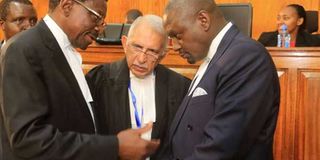Raila asks Supreme Court judges to nullify Uhuru win

Nasa lawyers from left: James Orengo, Pheroze Nowrejee and Otiende Amollo at Supreme Court on August 29, 2017. Mr Raila Odinga is challenging President Uhuru Kenyatta's win. PHOTO | JEFF ANGOTE | NATION MEDIA GROUP
What you need to know:
- Mr Odinga case has been that the presidential results were not transmitted electronically as required by law.
- He insisted that at the time of announcing the final results, the chairman was not in possession of 11, 000 forms 34A.
National Super Alliance leader Raila Odinga has asked the Supreme Court to nullify the outcome of the August 8 presidential election because President Uhuru Kenyatta was not validly elected.
Mr Odinga told the court that the election was shambolic and the electoral commission conducted it in a manner that violated constitutional and legal provisions.
He said the final results was not based on either electronic or manual delivery of forms 34A or 34B
Taking time to reply to the submission by the respondents, Mr Odinga lawyers said the electoral commission and its Chairman Wafula Chebukati had failed to respond to the substantive issues they had raised on the conduct of the election.
CONTEST
Mr Odinga lead counsel James Orengo told the court that if proper scrutiny is conducted, it will be established that the 2017 General Election was shambolic.
“Like everything else elections have losers and winners,” Mr Orengo said, pointing to the court to establish that the process is as important as the outcome of an election contest.
Lawyer Otiende Amollo told the court that instead of responding to the issues, both the commission, Mr Chebukati and President Kenyatta had decided to create an imaginary case and respond to it in the way they wanted, suggesting this was contemptuous to the people of Kenya.
“The truth of the matter is that the lawyers for President Kenyatta, the commission and Mr Chebukati have treated this court with a lot of contempt,” Mr Amollo said.
Mr Odinga case has been that the presidential results were not transmitted electronically as required by law.
DECLARATION
He has argued that forms 34A were not scanned and their images transmitted electronically, with Mr Amollo pointing out that the respondents had not responded these issues.
Mr Amollo further noted that the commission and its chairman had not explained whether all the statutory instruments were at his disposal before he made the final presidential declarations.
He insisted that at the time of announcing the final results, the chairman was not in possession of 11, 000 forms 34A and wondered on what basis the declarations was made.
He said the claim that the presidential results were made on the basis on forms 34B was erroneous because they are an aggregate of forms 34A, which he said were only available five days after the announcement of the results.
Mr Amollo, who is also the Rarieda MP questioned the haste with which the Mr Chebukati used to announce just three days after the polling yet he had seven days, saying this pointed to a mischief on the part of the commission.
VERIFICATION
“The law requires that presidential results come in randomly and from the polling stations. But this was not the case and the respondents have not responded to this,” he said.
In his submission, Senior Counsel Pherozee Nowrojee questioned the commission to explain how they made the announcement without forms 34A saying this was proof there was no verification.
He said that even though the returning officers had presented the forms at the national tallying centre, the commission withheld them for a total of five days and only released them to the petitioner after they had tampered with them.
“Forms 34A came and disappeared at the national tallying centre and no one seems to know what is happening. The only people with the answers to what might have happened have chosen not to provide evidence.
“The Constitution provides for the necessity to tally the presidential vote and verify but this was not done. The presidential declaration violated the law because it didn’t comply with the constitutional provisions,” he said.




